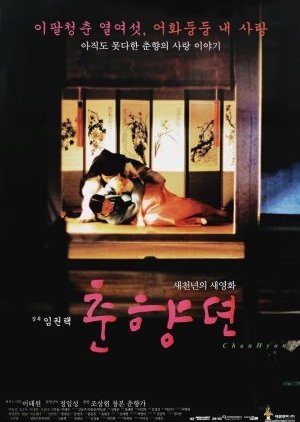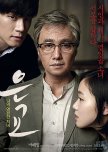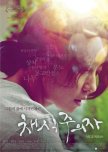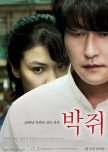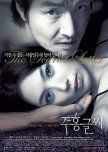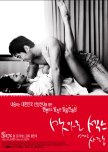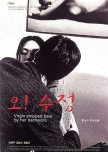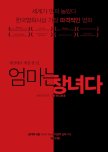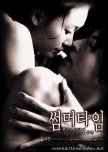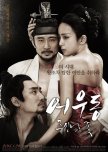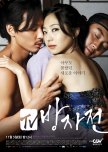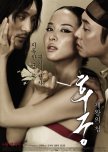Much of the narrative is sung. but do not be put off by this presentation. It will grow on you. The ending is superb and worth the wait.
Vond je deze recentie nuttig?

The story has been dramatized many times on film. Besides this version, released in 2000 by director Im Kwon-taek, there was also a retelling of the story in the 2008 film, The Servant. Another version from 1968 exists. It stars one of South Korea's most well-known veteran actors, Shin Seong-il.
In the Story of Chunhyang as depicted by this film, the young nobleman, a scholar, takes an interest in the beautiful daughter of a courtesan at first sight. As custom dictates that a courtesan's daughter is also a courtesan the young master orders his servant to fetch the girl, thinking she'll be an easy lay. To his amazement she rebuffs his advances & reveals she’s no light skirt, but a scholar herself, gifted in art and poetry. This makes him fall for her even more and so begins their story.
And a beautiful, simple, upbeat story of love it was. I enjoyed every minute of it. The characters featured in this film are younger than those featured in The Servant (2008) & Chunhyang (1968). And ahh, the wonders of young love, new love. I never get tired of it. Never.
The film turned out to be so unlike what I expected. I had no prior knowledge of the folk tale so I thought this was going to be tragic & indeed there is this Romeo & Juliet feel to it, but that’s about where the comparison ends.
The acting was reasonably well done considering this was the acting debut of both leads, and the chemistry between these two love birds was sizzling. They made a very cute couple. I could watch them frolic & dilly-dally around all day. Female viewers can look forward to serious eye candy in the form of Cho Seung Woo. Though he's really young in this movie (around 19 I think) the guy is a distraction, perhaps THE most photogenic South Korean actor I've ever come across. You know who's gonna be stalking him from now on... LOL
Strong themes of duty, everlasting love and loyalty make up The Story of Chunhyang, as well as class differences and the role of women in pre-modern Korean society. It was all quite fascinating to watch. I felt like I gained a deeper insight of Korean culture & history.
But more than anything else I'm giving this movie high scores of 10 because this is what I consider a filmmaker's film – where a good balance of both creative & technical excellence was achieved to create something artistic & unique. I don't know if I'd go as far as to say it's a masterpiece, but there's a strong sense of the director's voice here. And I liked that voice. It was captivating. It pulled me in, made me smile, made me wonder what would happen next. The story is told with traditional linear narrative, but with an unconventional twist. I suspect audiences who are not appreciative of movies as an art might find this a bit off-putting simply because it is different & not what they might be used to.
Personally, I think director Im Kwon-taek deserves props for this unexpected, but refreshingly original unveiling of the story. I won't reveal exactly how or what was done, except to say you've probably never seen a movie narrated quite like this in a long time, if ever at all.
The OST is a wonderful mash-up of old Korea sounds that were always beautifully matched with interesting, pleasing to the eye pictures.
I thought it was pretty well done.
Vond je deze recentie nuttig?

I do oddly enjoy dramas or films based in past Korean culture and Chunhyang truly lived up to that while addressing a part of the culture then I was not aware of. The film provides narration from a Pansori – “a Korean genre of musical storytelling performed by a vocalist and drummer” Google. This was the first I had come across this sort of storytelling so I was intrigued to experience. It did take me awhile to get used to the Pansori’s delivery of the events through what felt like slow-motion singing, however, as the plot developed it became more prominent and at times the Pansori’s delivery style provided life to the scene on screen.
Chunhyang is a film about a governor’s son named Mong Ryong whom falls in love with a Gisaeng’s daughter, named Chun Hyang. At first I had to google what a courtesan was too – “was the Korean equivalent of a geisha or courtesan knowledgeable in poetry, dance, music, culture and politics, who entertained noblemen and royalty of the Joseon Dynasty”. However in the subbed copy I watched she was called a courtesan whom is “a prostitute, especially one with wealthy or upper-class clients” Google. Chun Hyang had insured that she grew up with the mentality and essence of a fair lady in hopes of distancing herself from the title and stigma of her mother choice of career. As the young lovebirds get to know one another (*EXPECT SOME MILD NUDITY*); unexpected occurrence happen that require Lee Mong to leave the town. This is when the story begins to interestingly unfold through the introduction of a new governor in town whom you could say provides life to the love based plot through his use of power from his title. It is refreshing that the main characters do not allow their social class or age to undermine their feelings and love. They both respected one another enough to faithfully love each other despite the distance.
ACTING: 9/10
The chemistry between the actors is believable due to their credible acting abilities. They skills of acting in a manner that you can sense the chemistry of the lovers is made more outstanding due to this have been their debut roles for both. However I did enjoy watching Jo Seung Woo more than Lee Hyo Jeong. He just had a presence of importance in a non-arrogate way to him.
MUSIC: 6.5/10
Not much to say regarding the music for the drummer accompanying the narrator; beside the narration of the story through song.
LIKED: My favourite scene would have to be Mong Ryong’s part at birthday celebration.
DISLIKED: Can’t actually think of something I did not like for despite the governors abuse of his power may be viewed as wrong, however without it the Chunghyang’s story would probably be boring.
CONCLUSION:
You should definitely watch this movie if you enjoy genres such as FORBIDDEN LOVE due to indifferent SOCIAL STATUS/ CLASS – REBELLION – PANSORI STORYTELLING – 13th CENTURY KOREA – FAITHFULNESS – USAGE OF POWER/ STATUS -
Vond je deze recentie nuttig?

Deze recentie kan spoilers bevatten
WARNING: MAY CONTAIN SPOILERSI am aware that Chunhyang is a classic korean folktale, and I am aware that many people love and cherish this story. Well, here's why I'm not one of those people (and why that's okay):
Rather than a touching love story, Chun Hyang uses a classical star-crossed lovers trope to reinforce stereotypical gender roles and shame female sexuality. Mong Ryong plays the stoic, heroic man who is revered for his looks, intelligence, and status as a nobleman. Chun Hyang is the "ideal" confucian wife: shy and sexually innocent yet passionate in bed, intelligent and well-spoken, and ABOVE ALL completely devoted to her husband. The story constantly reinforces these roles: rather than display passion and mutual love, the wedding night scene is used to display Chun Hyang's "shyness" (which honestly comes off as reluctance or non consent) Mong Ryong's sexual prowess as he literally chases after Chun Hyang and takes her clothes off. Chun Hyang is continually shamed for her sexuality, and even when they are having sex Chun Hyang must play hard-to-get. Very few times does Chun Hyang initiate intimacy, and when she does it is to reinforce her role as the doting, dedicated wife. These gender roles continue when Mong Ryong is sent to Seoul: Chun Hyang is overcome with emotion and throws a temper tantrum while Mong Ryong remains the stoic scholar. Chun Hyang becomes a shell of a person and cannot continue to live a functional life without her husband—despite the fact that she was an accomplished woman (in writing, painting, sewing, and music) before she met Mong Ryong. In the end, Mong Ryong is excused after abandoning his wife for three years while Chun Hyang is revered for remaining chaste.
In the end, this story isn't a romantic tale of two lovers—it is a story of neglect, of dedication that threatens the mental and physical safety of Chun Hyang, and of sexual repression and public shaming that only reinforces the virgin/whore dichotomy.
Vond je deze recentie nuttig?

